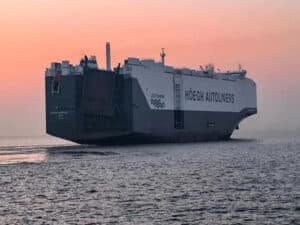
SEA\LNG study makes strong case for LNG as a VLCC fuel
Written by Nick Blenkey
The SEA\LNG coalition has released the results of an investment study that, it says, shows that LNG is “a compelling investment solution” for VLCCs operating onthe Arabian Gulf to China trade route.
Conducted by independent simulation and analytics consultancy Opsiana, the study demonstrates clear benefits of LNG as a marine fuel for a newbuild 300K DWT VLCC on the Arabian Gulf to China trade route, in comparison with other alternatives currently available.
The business case compares the relative investment performance of four propulsion alternatives: a conventional VLCC sailing with Very Low Sulfur Fuel Oil; a scrubber-equipped VLCC sailing mostly with Heavy Fuel Oil; and two LNG-fueleded VLCCs, one with a high-pressure two-stroke engine, the other a low-pressure two-stroke engine.
According to SEA\LNG, “the study clearly indicates that LNG as a marine fuel delivers a strong return on investment on a net present value (NPV) basis over a conservative 10-year horizon. The analysis is bolstered by compelling paybacks from three to five years.”
Peter Keller, Chairman, SEA\LNG, commented: “This is the third in a series of investment studies commissioned to support shipowners and operators in decision-making at this crucial time. In addition to the positive results of studies undertaken by Opsiana for the liner and PCTC segments, this study underlines the compelling investment case for VLCCs.”
SEA\LNG says the route was chosen because it is the major energy trade corridor from the Middle East to China. Providing greater clarity for those investing in LNG, the study highlights several key findings: compelling returns on an NPV basis, the diminishing CAPEX hurdle for LNG engines, LNG delivers competitive energy costs, has higher environmental performance, and is the most financially effective long-term method for complying with the IMO 2020 sulfur cap.
While the results of this study are based on a set of fuel forecast assumptions, through the “Reader’s Choice” modeling, provision has also been made for each reader to apply their personal crystal ball on future prices. Impacts of other CAPEX values whose premiums may change as a result of differences across three principal categories – market, technology, physical – can also be incorporated.
Keller concluded: “As convincing, qualified evidence supporting the environmental, operational and commercial benefits of LNG continues to emerge, acceptance of its credibility is becoming increasingly widespread and concrete. LNG is the only safe, mature, commercially viable marine fuel that offers superior local emissions performance, significant greenhouse gas reduction benefits today, and a pragmatic pathway to a zero-emissions shipping industry.”
The full investment study can be accessed HERE




